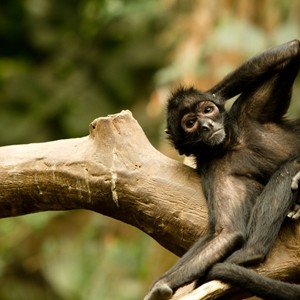
PETA files copyright lawsuit on behalf of monkey over selfie
October 8, 2015 5:25 pm Leave your thoughts
In what has to be one of the strangest confluence of activism and pop culture, the animal rights group People for the Ethical Treatment of Animals (PETA) has filed a federal lawsuit on behalf of a macaque monkey who took the now-famous selfie photographs.
The suit was filed in federal court in San Francisco by PETA and seeks a court order allowing all proceeds from the photos for the benefit of the monkey (identified as 6-year-old Naruto) and other crested macaques living in a reserve on the Indonesian island of Sulawesi. The photo was taken with the camera of British nature photographer David Slater when he left his camera unattended and the curious monkey triggered the pictures. Slater has since published the photos as part of a book called "Wildlife Personalities" through San Francisco-based self-publishing company Blurb.
"While the claim of authorship by species other than homo sapiens may be novel," said PETA in the suit, "'authorship; under the Copyright Act, 17 U.S.C. § 101 et seq., is sufficiently broad so as to permit the protections of the law to extend to any original work, including those created by Naruto."
"The act grants copyright to authors of original works, with no limit on species,'' said Jeffrey Kerr, a lawyer with PETA, whose suit has been filed under the legal designation "next friend," used by those filing for those who cannot file themselves. "Copyright law is clear: It's not the person who owns the camera, it's the being who took the photograph.''
CNN legal analyst Danny Cevallos has called this logic into question, stating that, "Materials produced solely by nature, by plants or by animals are not copyrightable."
The issue of the photo's authorship has been called into question before in regards to Slater's battle with Wikimedia, who contests that since the photo was taken by an animal, no one legally owns the copyright and the photo can be reproduced without compensation.
"Monkeys don't own copyrights," said Wikimedia Foundation's Chief Communications Officer Katherine Maher. "What we found is that U.S. copyright law says that works that originate from a non-human source can't claim copyright."
As silly as it may seem, the case could have wide-reaching legal implications regarding definitions of personhood (as is PETA's presumed intent) as well as ownership of material created by non-humans. Maher has said the organization is confident that the legal basis for disseminating the selfie against Slater's specific request is sound due to the fact that Slater has no grounds to claim ownership (not having made "substantial changes" to the image beyond cropping, color correcting and other cosmetic adjustments). And of course, if Slater is not the "author" of the image, the image can be used (and sold) by any source.
"I am obviously bemused at PETA's stunt but also angry as well as sad," wrote Slater on his Facebook page, adding that he has worked with the organization in the past. "This makes animal welfare charities look bad which saddens me, deflecting away from the animals and onto stunts like this."
While PETA has a history of pursuing lawsuits offering little chance of success—for example, a dismissed 2011 lawsuit against SeaWorld citing the U.S. Constitution's ban on slavery—some legal experts like David Favre, a Michigan State University law professor and animal rights advocate, says that the copyright issue raised by PETA "is a cutting edge legal question.''
If you believe someone other than yourself is selling your intellectual property has been, contact the law professionals at The Law Offices of Donald W. Hudspeth, P.C. today. We will review the details of your case and advise you as the nest steps in proceeding.
Categorised in: Asset & Liability Protection, Intellectual Property Law, Litigation
This post was written by multi_admin




